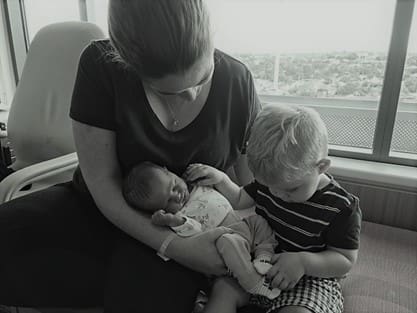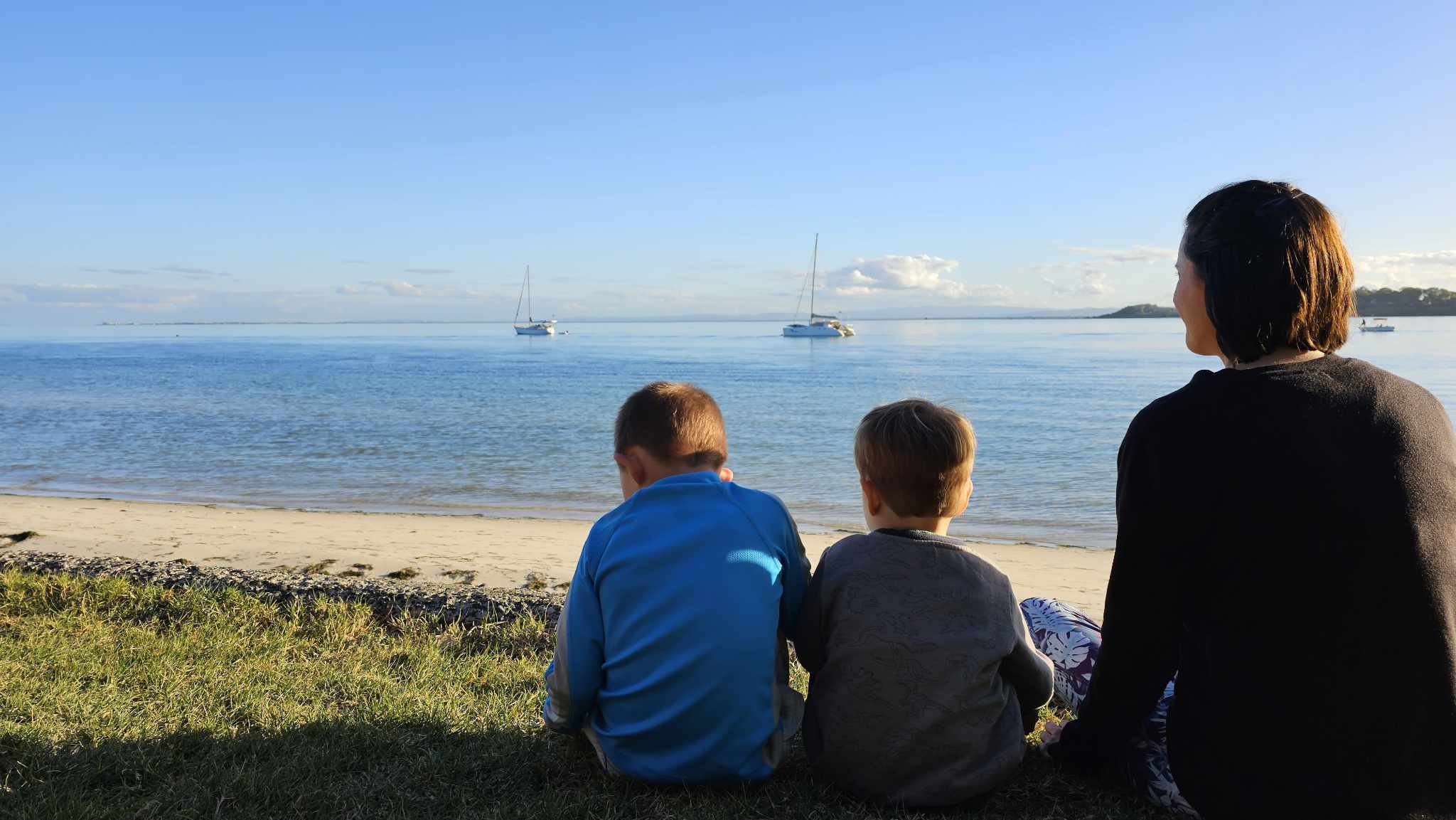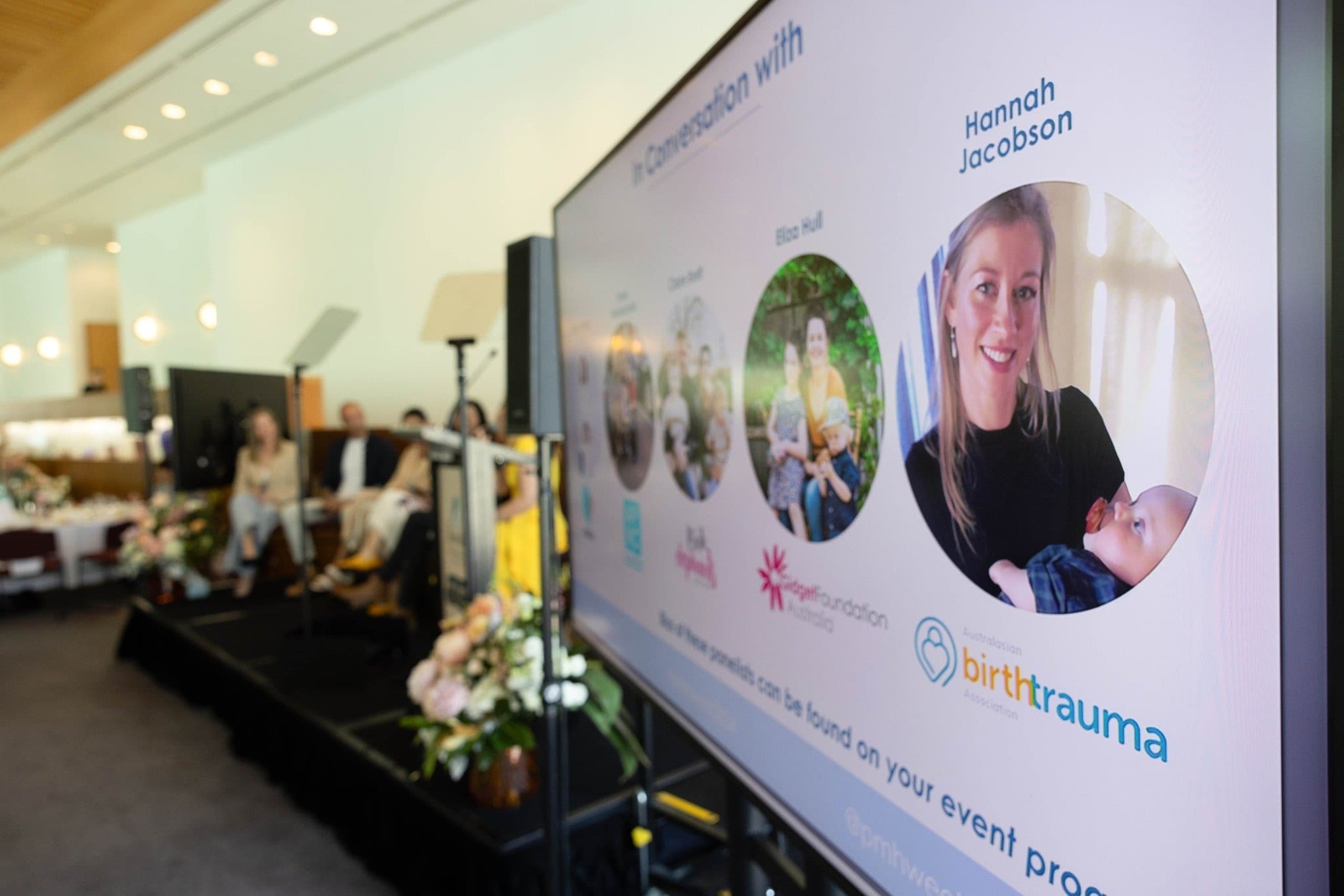Trigger Warning: This birth story discusses trauma, topics discussed include forceps delivery, pelvic organ prolapse, and mental health struggles. If you are seeking support for your birth trauma, you may wish to contact our Peer Support Service.
As a first-time mum Erin experienced a 4th degree tear, something that hadn’t been spoken about in her ante-natal support classes. Left in the dark on how to recover from her injury Erin sought solace in online support groups where she was able to connect with other women that had experienced 3rd and 4th degree tears. Here she recounts her journey to healing after a 4th degree tear and her decision to have a second birth where she could feel in control.
I had my first baby in October 2020; year one of the COVID-19 pandemic. Being pregnant during the COVID-19 pandemic was lonely, and stressful. These feelings were only amplified following the birth of my son.
Within 2 hours of arriving at hospital, (I was 9cm dilated and experienced a silent labour up until this point), my son arrived. The first thing I said was “wow, that is a lot of blood”. Within minutes the room was filled with staff, all trying to find the source of the bleeding. I can still remember the excruciating pain of them pressing down on my stomach making my uterus contract to help rule out one theory. I was soon taken to theatre “for better light” where I was put under a general anaesthetic. When I woke up in recovery alone, I was told I sustained a fourth-degree tear and post-partum haemorrhage, losing 1.6L of blood. At the time I didn’t understand the gravity of the situation, but over time hearing other women’s stories and undertaking my own research, I am so grateful to have had my son in a well resourced hospital.
Initially it was hard to find resources on how to recover from a fourth-degree tear, I didn’t know anyone who had experienced it, and it wasn’t something spoken about in our ante-natal support. The support seemed to only prepare us for the birth itself, not recovery or the fourth trimester. This only amplified my feelings of loneliness. I eventually found an online support group with other women who had experienced a third or fourth degree tear. Reading their posts made me feel less alone, and helped me understand what had happened to me. It was in this group an article was shared about incontinence following childbirth. I shared it on my personal page, and I openly discussed the shame and struggles I was feeling. In this same post I asked other women to talk about their experiences, still today I receive messages from women sharing similar stories. This was powerful, and it is why I continue to talk openly about what happened to me, because I don’t any woman to feel how I felt; which was completely alone.
I first heard the word trauma in the hospital, but at the time it didn’t feel traumatic because I was reminded I had a healthy child, I had nothing to compare it too and I was still in the safety net of the hospital setting. At my 6-week post-partum appointment, I had been told I had healed and could resume normal activities. I remember bursting into tears, I felt far from healed. I knew then I wasn’t ok with what had happened to me. I may have recovered physically from my fourth-degree tear, but it was the mental scars that remained.
I knew early on, part of my healing journey would be to have a second child, because I wanted to be in control of my story moving forward. In August 2021, I became pregnant again, we made sure we found an Obstetrician who understood what I had been through and where I only had to re-tell my story once. Together, we scheduled in a c-section at 39 weeks as a proactive approach to avoid going into labour again. I felt really good about this decision, but one thing I didn’t prepare for was returning to an operating theatre. I walked into the room, and became completely overwhelmed. In my mind I was back where I was 19 months earlier when my life changed completely. I burst into tears, and didn’t stop crying until I was in recovery. Thankfully, I had the support of my husband and a wonderful anaesthetist nurse who showed compassion and understanding during this time.
Leading up to the birth of our second child, my biggest fear was being separated from her, as I believed the separation I experienced with my first born impacted my bond and I didn’t want to go through that again. Unfortunately, my biggest fear came true, she required assistance via a CPAP machine and was taken to the special care unit to be monitored closely over a 24 hour period. As hard as this was, it did show me it wasn’t the separation that impacted my bond with my first born. I have since realised it was the mental fog I experienced from the blood loss, medication side effects and the tear itself. It was these things which ultimately effected my ability to breastfeed, being independent with my toileting, feeling confident to leave my home and care for my son the way I wanted too (along with other contributing factors like ongoing COVID-19 restrictions of border closures, limited face-to-face support, and visitor limits within the home). I felt so much had been taken from me, and looking back now, I can see that I was grieving and continue to grieve what “should’ve been”.
Once my daughter was reunited back with us, I was in control of what happened next. I had the physical and mental capacity to breastfeed, and continued to do so until it was no longer right for me. This time round I was the one who made the choice and I didn’t carry the same guilt of feeling like my body had let me down. I felt I had the mental clarity to be the type of parent I wanted to be.
Another area I was able to be in control of was my post-partum plan for the fourth trimester. Given there is much more awareness about c-section recovery and having close friends who had experienced it before, I was able to get a sense of what support I would need to assist with my recovery. Thankfully by this point, COVID-19 restrictions had eased and we were able to have family stay with us over a 7 week period, which was a big part of my recovery journey and something I needed and wished I had with our first born. I made sure I booked follow-up physio appointments and had a therapy appointment scheduled within the first six weeks with my treating Psychologist. I feel investing the time into my post-partum plan allowed me the space I needed to recover physically, and give me time to reflect on my triggers and what I need to do to continue my healing journey. Over the next few months, I will start EMDR therapy to address my birth trauma, and begin study to become an Applied Coach. I will be able to learn new skills for my own development and in hope to one day support other woman on their own healing journey when recovering from birth trauma.
If you would like to connect with a person who has experienced birth-related trauma, please contact our Peer2Peer Support service to connect with one of our Peer Mentors.
If you’d like to support our work so we can continue to help women like Erin you can donate here.




